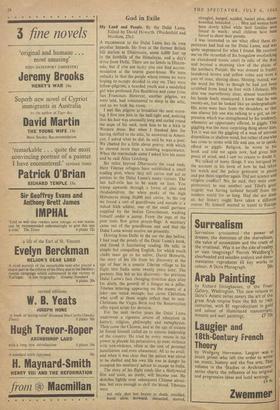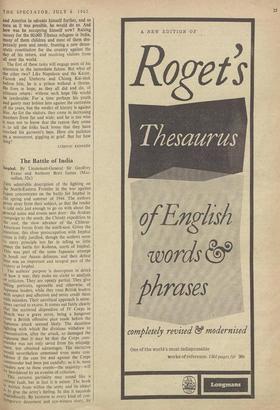God in Exile
A PILGRIMAGE to the Dalai Lama has its own peculiar hazards. He lives at the former British
hill station at Dharmsala, some 6,000 feet up in the foothills of the Himalayas, and a day's drive from Delhi. There are no hotels in Dharm- sala, but if you are lucky you can find accom- modation at the tourist guest-house. We were unlucky in that the people whose rooms we were hoping to occupy decided to stay on. They were fellow-pilgrims, a bearded youth and a sandalled girl who professed Zen Buddhism and came from San Francisco. However, another pilgrim, we were told, had volunteered to sleep in the attic, and so we took his room.
I met this pilgrim at breakfast the next morn- ing. I first saw him in the half-light and, noticing that his hair was unusually long and curled round
the nape of his neck, took him to be a Sikh in Western dress. But when I thanked him for
having shifted to the attic, he answered in Ameri- can. I asked what he did; he said he was a poet. We chatted for a little about poetry, with which
he showed more than a nodding acquaintance. When the marmalade came 1 asked him his name and he said Allen Ginsberg.
Six miles beyond Dharmsala the road ends. Here Tibetan refugees have established a small trading post, where they sell curios and act as porters to the Dalai Lama's many visitors. The last half-mile has to be made on foot. You tramp upwards through a forest of pine and rhododendron, the white peaks of the high Himalayas rising 10,000 feet above. At the top we found a sort of guardhouse and outside it a naked Sikh soldier, one of the small garrison supplied by the Indian Government, washing himself under a pump. From the tops of the pine trees flew green prayer-flags. A secretary came out of the guardhouse and said that the Dalai Lama would receive me presently.
Driving from Delhi in the car the day before, I had read the proofs of the Dalai Lama's book, and found it fascinating reading. He tells, in simple but compelling English, for which much credit must go to his editor, David Howarth, the story of his life from his discovery at the age of four in a remote Tibetan village to his flight into India some twenty years later. The portents that led to his discovery--the previous Dalai Lama's face changing direction days after his death, the growth of a fungus on a pillar, Tibetan lettering appearing on the waters of a lake—are weird enough; but clever Christians who scoff at them might reflect that to non- Christians the Virgin Birth and the Resurrection offer equal scope for derision.
For the next twelve years the Dalai Lama underwent a rigorous course of education in history, religion, philosophy and metaphysics. Then came the Chinese, and at the age of sixteen he found himself called on to assume leadership of the country. He tried by every means in his power to placate his persecutors, to meet violence with non-violence, often at the cost of personal humiliation and even abasement. All to no avail; and when it was clear that the palace was about to be shelled and his own life was in danger he accepted his ministers' advice to escape to India.
The story of his flight reads like a Hollywood film and soon, no doubt, will become one. He sketches lightly over subsequent Chinese atroci- ties, but says enough to chill the blood. Tibetans Were not only shot but beaten to death, crucified, burnt alive, drowned, vivisected, starved, strangled, hanged, scalded, buried alive, disem- bowelled, beheaded. . . . Men and women have been slowly killed while their families were forced to watch: small children have been forced to shoot their parents.
I was interested to see what effect these ex- periences had had on the Dalai Lama, and was quite unprepared for what I found. He received me on the verandah of his bungalow overlooking an abandoned tennis court (a relic of the RaJ) and beyond a stunning view of the plains of the northern Punjab. He was dressed in freshly laundered brown and yellow robes and wore a pair of stout, shining shoes. Shining, indeed, was the word for him, as though he had just been scrubbed from head to foot with Lifebuoy. His skin was marvellously clear, almost translucent, his hands finely manicured. I knew that he was twenty-six, but he looked like an undergraduate. His arms were bare from the shoulders, so that one almost felt one was talking to a girl, an im- pression which was strengthened by his tendency, whenever an opportunity offered, to giggle. This giggling was the most surprising thing about hum Yet it was not the giggling of a man of nervous disposition or shallow mind, but rather of one who has come to terms with life and can, so to speak, afford to giggle. Religion, he wrote in his book and told me again now, had given tun) i peace of mind, and I saw no reason to doubt it.
We talked of many things. I was intrigued by the account in his book of how he had taken his watch and the palace generator to pieces and put them together again. Did not science and religion conflict? No, he said, they were corn- plementary to one another, and Tibet's great tragedy was having isolated herself from the modern world for so long. Had she not done so, her history might have taken a different course. He himself wanted to travel to Europe and America to educate himself further, and as soon as it was possible, he would do so. And how was he occupying himself now? Raising Money for the 60,000 Tibetan refugees in India, many of them children and most of them des- perately poor and needy, framing a new demo- cratic constitution for the country against the day of his return, and receiving visitors from all over the world.
The first of these tasks will engage most of his attention in the immediate future. But what of the other two? Like Napoleon and the Kaiser, Farouk and Umberto and Chiang Kai-shek before him, he is a prince without a throne. He lives in hope, as they all did and do, of ultimate return: without such hope life would be intolerable. For a time perhaps his youth and gaiety may bolster him against the corrosion of the years, but the verdict of history is against him. As for the visitors, they come in increasing numbers from far and wide; and he is too wise a man not to know that the reason they come
to tell the folks back home that they have touched his garment's hem. Here sits patience on a monument, giggling at grief. But for how long?
LUDOVIC KENNEDY











































 Previous page
Previous page